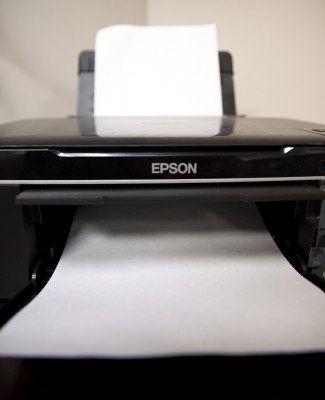[vc_row][vc_column][vc_column_text]

In an incident echoing a number of colleges and universities nationwide, a printer in the Boston University College of Communication received the printing job for an anti-Semitic flyer Monday morning.
“When I saw [the flyer] … it was the first thing I saw,” Jose Ponce, a senior production assistant in COM, said of when he found the flyer in his printer. “I was obviously a little shocked by it, so I called the cops, BU Police. The IT person we have in the building called me later and said [hackers] try to access open IP accounts, and it so happens that our printer was.”
Jill Beckman, the director of service desk and desktop services at BU’s Department of Information Services and Technology, stated that the first incident reported at BU happened March 24. Since then, the department had received more than 20 reports of the same incident from different areas on the Charles River Campus, Beckman wrote in an email.
“[Twenty] is a very small percentage of total printers on campus,” Beckman wrote. “Incidents like these occur when networked printers are accessible from the Internet. We are also working to move all printers to a private network.”
IT staff had been able to apply security settings to new printers so they are less prone to similar abuses and are working to discover and apply the settings to any printers that have been missed, Beckman noted.
Scott Paré, BUPD deputy director of public safety, said the group was able to hack the printer because it was not behind a network security firewall. He said there had been several reports of this type of hacking on campus, including other printers with open ports and office fax machines.
“We had a couple of other reports previously, and obviously what we ask is that anyone who receives this type of hateful [flyer], that they contact us immediately,” Paré said.
The flyer includes two swastikas and instructs a “white man” to “join us in the struggle for global white supremacy.” It accuses Jews of “destroying your country though mass immigration and degeneracy” and provides a web address for the Neo-Nazi group. The site, The Daily Stormer, claims credit for the flyer and posted on its website, “Thousands of printers are printing this flyer, all across the globe!”
BU Dean of Students Kenneth Elmore said he hopes students are aware of the university’s efforts to prevent similar “unsettling” incidences from happening and hopes students have people they trust to talk to.
“There’s this vulnerability we certainly feel when people are able to … come into our lives through our printers, our phones, in ways that we don’t expect and we don’t think could happen,” Elmore said.
Initial reports of the incident began Saturday. The flyer had shown up in a number of higher education institutions including Brown University, California State University at Long Beach, Clark University, DePaul University, Oregon State University, Princeton University, the University of California at Davis, the University of Oregon, the University of Rhode Island and the University of Southern California.
Several colleges and universities in the Commonwealth of Massachusetts that have experienced similar incidences include Smith College, the University of Massachusetts Amherst and Northeastern University.
A NEU representative wrote in an email to The Daily Free Press that more than 20 printers around campus were hacked and have received the flyers. The university’s data security staff determined the hacking orginated from overseas, the statement noted.
“We quickly put a firewall in place to block further attacks,” according to the statement. “This should substantially mitigate this kind of risk, but our experts say it cannot be completely eliminated.”
Several BU students said the act of hacking a printer and spreading a troubling message is both inconsiderate and concerning.
Caspar La Pierre, a freshman in the College of Arts and Sciences, said he disapproves of the fact that the printers were hacked, but thinks anyone should be allowed to express his or her beliefs.
“If they hacked the printer, that, of course, is not OK,” La Pierre said. “That’s breaking all kinds of rules. But the fact that you should be allowed to express whatever you believe in should be maintained. Even though it might be frowned upon because of a history that is dark.”
Christine Magill, a sophomore in CAS, said this incident made her worried for other hateful acts that may occur in the wake of the presidential election.
“That’s not something that people see a lot,” she said. “To have something like that pop up now, with the politics and everything going on in the U.S. presidential election, it’s scary. There have been a lot of comparisons with [the Nazi] regime and Trump and all of the things that are happening.”
Sara Gorton, a sophomore in COM, said she was disappointed in the group that committed the hacking.
“Obviously that shouldn’t happen, and it sucks that there are people out there who are like that,” she said. “They actually believe the propaganda and things like that and go so far as to try to distribute it on college campuses.”[/vc_column_text][/vc_column][/vc_row][vc_row][vc_column][vc_toggle title=”Trigger warning: Anti-semitic material” el_id=”1459413279534-3635e4e6-2787″]

[/vc_toggle][/vc_column][/vc_row]

















































































































